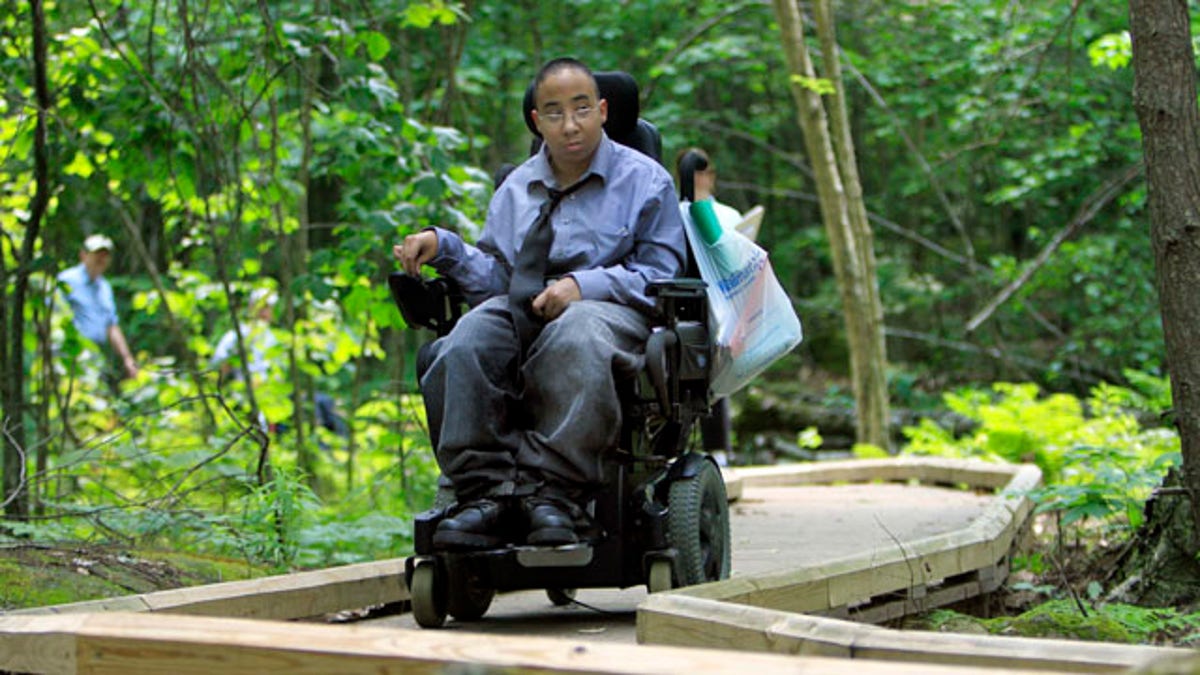
In this Thursday, June 16, 2011, photo, Chelsea Fernandez steers her wheelchair through the woods at the Crotched Mountain Rehabilitation Center in Greenfield, N.H. The center offers over 2.5 miles of privately funded trails designed to be easily accessible for people in wheelchairs and those who have difficulty walking. (AP Photo/Jim Cole)
GREENFIELD, N.H. – Chelsea Fernandes steered her wheelchair up and down the forest trail, passing a maple grove, zigzagging over water along a narrow boardwalk, and stopping to look at a beaver-built wetland — a view she never thought she'd experience from her wheelchair.
Considered unique by the U.S. Forest Service for offering the disabled unparalleled access to mountain wilderness, the 2 1/2 miles of trails at Crotched Mountain Rehabilitation Center in southern New Hampshire will open to the public Friday.
"It allows me to be like everybody else, to experience nature like everybody else," said the 22-year-old, who was born with cerebral palsy. "It allows me to experience life in whole different light and it allows me to get away from my day-to-day routine. And it kind of helps me relax when times get stressful."
The center's trails offer climbs, twists and turns, and lush views of hillsides and mountains. They were designed with the goal of easy access to people of all abilities, including people in wheelchairs and those who have difficulty walking.
One trail goes through the woods and the other through a meadow; they are the longest of their type in a mountain setting and they combine multiple features — steep terrain, bridges and boardwalks, places to rest — in a consolidated space. Hikers can see blueberry fields, wildflowers, and the occasional moose.
"It doesn't scream accessibility, and yet, it is," said Janet Zeller of the Forest Service, which has developed a set of trail accessibility guidelines. The rehabilitation center followed those guidelines in designing and building its trails.
Zeller said she is not aware of any other private organization that has designed such a trail system. She said there are trails in the national forest system that are all-inclusive, such as some in New Hampshire's White Mountain National Forest, but they are not as long, nor do they have the variety in terrain. But there is a growing interest among states to have such trails, she said.
The 2000 census showed 54 million people with disabilities, Zeller said. The 2010 numbers haven't been released yet.
"Plus, we know by 2030, over 80 million people will be over 65 and currently one out of every two people over 65 have a disability," she said. "So there are lots of people who would benefit from accessible design — and they don't recreate alone."
The nonprofit rehabilitation center at Crotched Mountain — so named because of its V-shaped peaks resembling the crotch of a tree — has a hospital, a school, and outpatient and community services for people with disabilities such as brain and spinal cord injuries, stroke, and other neurological and medical conditions. Therapy is offered for physical, occupational and speech impairments. The center treats more than 2,000 people annually throughout New England.
The $500,000 trail system, which was privately funded, is an extension of the center's mission to provide a caring environment for people with disabilities — and do something special with its 1,400 mountainside acres.
"The idea is, 'Can we build a community of accessibility in the wilderness?'" said Donald Shumway the center's president and CEO.
The dirt and gravel paths — they are not paved — are broken up by bridges, boardwalks and platforms made out of mostly recycled materials, including plastic bags.
The meadow trail is called the Gregg Trail in honor of institution founder Harry Gregg — the grandfather of former U.S. Sen. Judd Gregg — and his family. It ascends 200 feet and reaches an 8 percent grade — generally considered moderate difficulty even for foot hikers.
Mark Race, 55, commented on the workout his arms were getting as he steered his manual wheelchair up the path.
"A power chair or a scooter would be easy," said Race, who suffered a spinal cord injury in a car accident in 1980. He said hiking up with his chair was a challenge, but doable.
"You wouldn't want to be in a hurry," he added.
Hikers who use powered wheelchairs are encouraged to make sure their batteries are charged and may want to consider hiking with a friend if it's their first time.
"You're on your own," said Michael Redmond, the center's chief operating officer.
"It's really a great opportunity for people to get out into the woods," said David Lee, assistant director of program operations at Northeast Passage, which runs disability-related sports and recreation programs and services throughout New England.
People with disabilities "typically don't have that option, unless they have a team of people helping them," he said.
___
Online:
http://www.crotchedmountain.org/




















